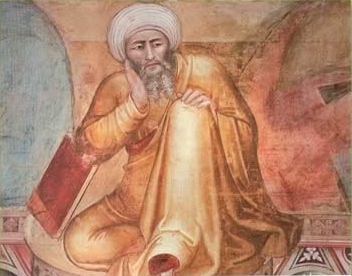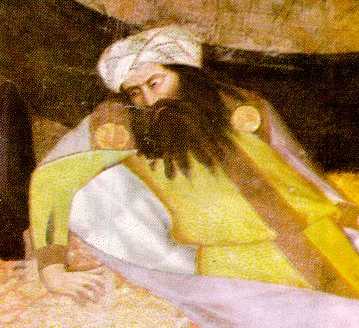<Back to Index>
- Philosopher and Polymath 'Abū I-Walīd Muḥammad bin 'Aḥmad bin Rušd (Averroes), 1126
PAGE SPONSOR
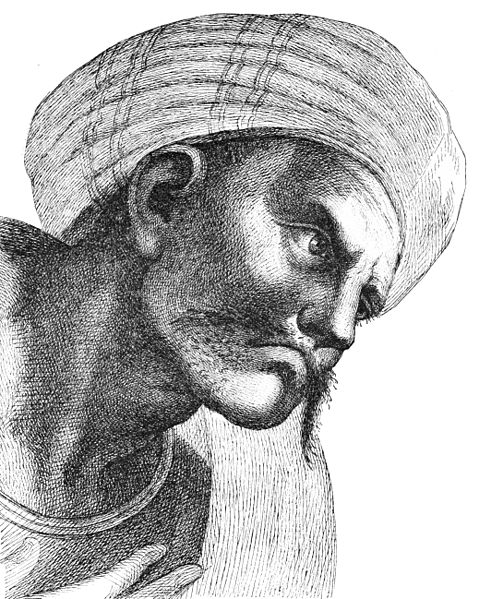
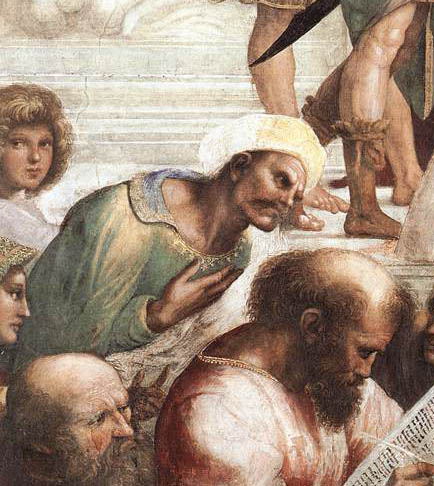
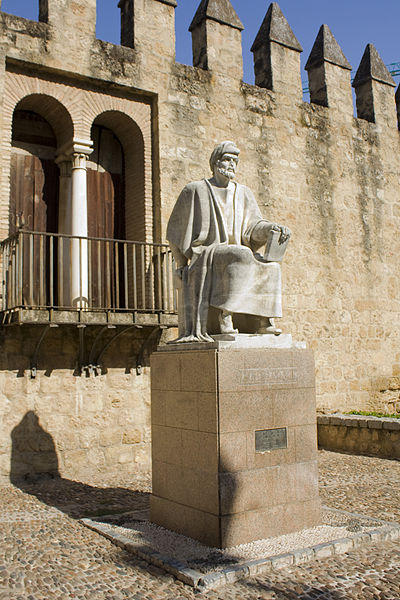
ʾAbū l-Walīd Muḥammad bin ʾAḥmad bin Rušd (Arabic: أبو الوليد محمد بن احمد بن رشد), better known just as Ibn Rushd (Arabic: ابن رشد), and in European literature as Averroes (1126 – December 10, 1198), was a Muslim polymath; a master of Aristotelian philosophy, Islamic philosophy, Islamic theology, Maliki law and jurisprudence, logic, psychology, politics, Arabic music theory, and the sciences of medicine, astronomy, geography, mathematics, physics and celestial mechanics. He was born in Córdoba, Al Andalus, modern day Spain, and died in Marrakesh, Morocco. His school of philosophy is known as Averroism.
Ibn Rushd was a defender of Aristotelian philosophy against claims from Islamic theologians such as Ghazali who feared that such teachings would become an affront to the teachings of Islam.
Averroes' name is also seen as Averroës, Averroès or Averrhoës, indicating that the "o" and the "e" form separate syllables. Averroes is a Latinisation of a Hebrew transcription of the Arab name Ibn Rushd.
According to Ernest Renan,
he was also known as Ibin - Ros - din, Filius Rosadis, Ibn - Rusid,
Ben - Raxid, Ibn - Ruschod, Den - Resched, Aben - Rassad, Aben - Rois, Aben - Rasd,
Aben - Rust, Avenrosdy Avenryz, Adveroys, Benroist, Avenroyth,
Averroysta, etc.
Averroes was born in Córdoba to a family with a long and well respected tradition of legal and public service. His grandfather Abu Al - Walid Muhammad (d. 1126) was chief judge of Córdoba under the Almoravids. His father, Abu Al-Qasim Ahmad, held the same position until the Almoravids were replaced by the Almohads in 1146.
Averroes’s education followed a traditional path, beginning with studies in Hadith, linguistics, jurisprudence and scholastic theology. Throughout his life he wrote extensively on Philosophy and Religion, attributes of God, origin of the universe, Metaphysics and Psychology. It is generally believed that he was perhaps once tutored by Ibn Bajjah (Avempace). His medical education was directed under Abu Jafar ibn Harun of Trujillo in Seville. Averroes began his career with the help of Ibn Tufail ("Aben Tofail" to the West), the author of Hayy ibn Yaqdhan and philosophic vizier of Almohad king Abu Yaqub Yusuf who was an amateur of philosophy and science. It was Ibn Tufail who introduced him to the court and to Ibn Zuhr ("Avenzoar" to the West), the great Muslim physician, who became Averroes's teacher and friend. Averroes's aptitude for medicine was noted by his contemporaries and can be seen in his major enduring work Kitab al - Kulyat fi al - Tibb (Generalities) the work was influenced by the Kitab al - Taisir fi al - Mudawat wa al - Tadbir (Particularities) of Ibn Zuhr. Averroes later reported how it was also Ibn Tufail that inspired him to write his famous commentaries on Aristotle:
Abu Bakr ibn Tufayl summoned me one day and told me that he had heard the Commander of the Faithful complaining about the disjointedness of Aristotle's mode of expression — or that of the translators — and the resultant obscurity of his intentions. He said that if someone took on these books who could summarize them and clarify their aims after first thoroughly understanding them himself, people would have an easier time comprehending them. “If you have the energy,” Ibn Tufayl told me, “you do it. I'm confident you can, because I know what a good mind and devoted character you have, and how dedicated you are to the art. You understand that only my great age, the cares of my office — and my commitment to another task that I think even more vital — keep me from doing it myself.”
Averroes was also a student of Ibn Bajjah ("Avempace" to the West), another famous Islamic philosopher who greatly influenced his own Averroist thought. However, while the thought of his mentors Ibn Tufail and Ibn Bajjah were mystic to an extent, the thought of Averroes was purely rationalist. Together, the three men are considered the greatest Andalusian philosophers.
In 1160, Averroes was made Qadi (judge) of Seville and he served in many court appointments in Seville, Cordoba, and Morocco during his career. Sometimes during the reign of Yaqub al - Mansur, Averroes' political career was abruptly ended and he faced severe criticism from the Fuqaha (Islamic jurists) of the time.
A contemporary of Averroes, Abdelwahid al - Marrakushi writing in 1224, reported that there were secret and public reasons for his falling out of favor with Yaqub al - Mansour:
And in his days [Yaqub al - Mansur], Abu al - Walid Ibn Rushd faced his severe ordeal and there were two causes for this; one is known and the other is secret. The secret cause, which was the major reason, is that Abu al - Walid [Averroes] — may God have mercy on his soul — when summarizing, commenting and expending upon Aristotle's book "History of Animals" wrote: "And I saw the Giraffe at the garden of the king of the Berbers".
And that is the same way he would mention another king of some other people or land, as it is frequently done by writers, but he omitted that those working for the service of the king should glorify him and observe the usual protocol. This was why they held a grudge against him [Averroes] but initially, they did not show it and in reality, Abu al - Walid wrote that inadvertently... Then a number of his enemies in Cordoba, who were jealous of him and were competing with him both in knowledge and nobility, went to Yaqub al - Mansur with excerpts of Abu Walid's work on some old philosophers which were in his own handwriting. They took one phrase out of context that said: "and it was shown that Venus is one of the Gods" and presented it to the king who then summoned the chiefs and noblemen of Cordoba and said to Abu al - Walid in front of them "Is this your handwriting?". Abu al - Walid then denied and the king said "May God curse the one who wrote this" and ordered that Abu al - Walid be exiled and all the philosophy books to be gathered and burned... And I saw, when I was in Fes, these books being carried on horses in great quantities and burned.
—Abdelwahid al-Marrakushi, "The Pleasant Book in Summarizing the History of the Maghreb" (1224)
Averroes's strictly rationalist views collided with the more orthodox views of Abu Yusuf Ya'qub al - Mansur, who therefore eventually banished Averroes, though he had previously appointed him as his personal physician.
Averroes was not reinstated until shortly before his death in the year
1198 AD. He devoted the rest of his life (more than 30 years) to his
philosophical writings.
Averroes's works were spread over 20,000 pages covering a variety of different subjects, including early Islamic philosophy, logic in Islamic philosophy, Arabic medicine, Arabic mathematics, Arabic astronomy, Arabic grammar, Islamic theology, Sharia (Islamic law), and Fiqh (Islamic jurisprudence). In particular, his most important works dealt with Islamic philosophy, medicine and Fiqh. He wrote at least 67 original works, which included 28 works on philosophy, 20 on medicine, 8 on law, 5 on theology, and 4 on grammar, in addition to his commentaries on most of Aristotle's works and his commentary on Plato's The Republic.
He wrote commentaries on most of the surviving works of Aristotle. These were not based on primary sources (it is not known whether he knew Greek), but rather on Arabic translations. There were three levels of commentary: the Jami, the Talkhis and the Tafsir which are, respectively, a simplified overview, an intermediate commentary with more critical material, and an advanced study of Aristotelian thought in a Muslim context. The terms are taken from the names of different types of commentary on the Qur'an. It is not known whether he wrote commentaries of all three types on all the works: in most cases only one or two commentaries survive.
He did not have access to any text of Aristotle's Politics. As a substitute for this, he commented on Plato's The Republic, arguing that the ideal state there described was the same as the original constitution of the Arab Caliphate, as well as the Almohad state of Ibn Tumart.
His most important original philosophical work was The Incoherence of the Incoherence (Tahafut al - tahafut), in which he defended Aristotelian philosophy against al - Ghazali's claims in The Incoherence of the Philosophers (Tahafut al - falasifa). Al - Ghazali argued that Aristotelianism, especially as presented in the writings of Avicenna, was self - contradictory and an affront to the teachings of Islam. Averroes' rebuttal was two pronged: he contended both that al - Ghazali's arguments were mistaken and that, in any case, the system of Avicenna was a distortion of genuine Aristotelianism so that al - Ghazali was aiming at the wrong target. Other works were the Fasl al - Maqal, which argued for the legality of philosophical investigation under Islamic law, and the Kitab al - Kashf, which argued against the proofs of Islam advanced by the Ash'arite school and discussed what proofs, on the popular level, should be used instead.
Averroes is also a highly regarded legal scholar of the Maliki school. Perhaps his best known work in this field is Bidāyat al - Mujtahid wa Nihāyat al - Muqtaṣid ( بداية المجتهد و نهاية المقتصد), a textbook of Maliki doctrine in a comparative framework.
Jacob Anatoli translated several of the works of Averroes from Arabic into Hebrew in the 13th century. Many of them were later translated from Hebrew into Latin by Jacob Mantino and Abraham de Balmes. Other works were translated directly from Arabic into Latin by Michael Scot. Many of his works in logic and metaphysics have been permanently lost, while others, including some of the longer Aristotelian commentaries, have only survived in Latin or Hebrew translation, not in the original Arabic. The fullest version of his works is in Latin, and forms part of the multi - volume Juntine edition of Aristotle published in Venice 1562 - 1574.
Averroes wrote a medical encyclopedia called Kulliyat ("Generalities", i.e. general medicine), known in its Latin translation as Colliget. He also made a compilation of the works of Galen, and wrote a commentary on the Canon of Medicine (Qanun fi 't-tibb) of Avicenna (Ibn Sina) (980 - 1037).
Averroes tried to reconcile Aristotle's system of thought with Islam. According to him, there is no conflict between religion and philosophy, rather that they are different ways of reaching the same truth. He believed in the eternity of the universe. He also held that the soul is
divided into two parts, one individual and one divine; while the
individual soul is not eternal, all humans at the basic level share one
and the same divine soul. Averroes has two kinds of Knowledge of Truth.
The first being his knowledge of truth of religion being based in faith
and thus could not be tested, nor did it require training to understand.
The second knowledge of truth is philosophy, which was reserved for an
elite few who had the intellectual capacity to undertake its study.
Averroes is most famous for his translations and commentaries of Aristotle's works, which had been mostly forgotten in the West. Before 1150 only a few translated works of Aristotle existed in Latin Europe (i.e., excluding Greek Byzantium), and they were not studied much or given as much credence by monastic scholars. It was in part through the Latin translations of Averroes's work beginning in the 12th century that the legacy of Aristotle was recovered in the West.
Averroes's work on Aristotle spans almost three decades, and he wrote commentaries on almost all of Aristotle's work except for Aristotle's Politics, to which he did not have access. Hebrew translations of his work also had a lasting impact on Jewish philosophy. His ideas were assimilated by Siger of Brabant and Thomas Aquinas and others (especially in the University of Paris) within the Christian scholastic tradition which valued Aristotelian logic. Famous scholastics such as Aquinas believed him to be so important they did not refer to him by name, simply calling him "The Commentator" and calling Aristotle "The Philosopher." Averroes also greatly influenced philosophy in the Islamic world. His death coincides with a change in the culture of Al - Andalus. In his work Fasl al - Maqāl (translated a. o. as The Decisive Treatise), he stresses the importance of analytical thinking as a prerequisite to interpret the Qur'an.
Averroes's treatise on Plato's Republic has played a major role in both the transmission and the adaptation of the Platonic tradition in the West. It has been a primary source in medieval political philosophy.
Averroes was one of those who predicted the existence of a new world beyond the Atlantic Ocean.
Averroes is also a highly regarded legal scholar of the Maliki school.
Perhaps his best known work in this field is "Bidāyat al - Mujtahid wa
Nihāyat al - Muqtaṣid," a textbook of Maliki doctrine in a comparative
framework. He is also the author of "al - Bayān wa’l - Taḥṣīl, wa’l - Sharḥ
wa’l - Tawjīh wa’l - Ta`līl fi Masā’il al - Mustakhraja," a long and detailed
commentary based on the "Mustakhraja" of Muḥammad al - `Utbī al - Qurtubī.
Reflecting the respect which medieval European scholars paid to him, Averroes is named by Dante in The Divine Comedy with the great pagan philosophers whose spirits dwell in "the place that favor owes to fame" in Limbo.
Averroes appears in a short story by Jorge Luis Borges, entitled "Averroes's Search", in which he is portrayed trying to find the meanings of the words tragedy and comedy. He is briefly mentioned in the novel Ulysses by James Joyce alongside Maimonides. He appears to be waiting outside the walls of the ancient city of Cordoba in Alamgir Hashmi's poem In Cordoba. He is also the main character in Destiny, a Youssef Chahine film. The asteroid 8318 Averroes was named in his honor.
